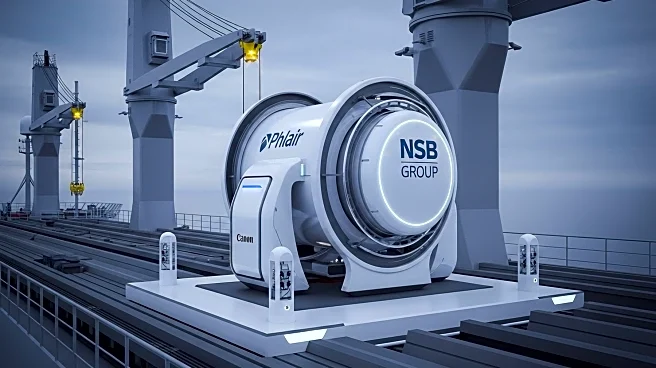What is the story about?
What's Happening?
NSB Group, a German shipowner, has entered into a partnership with Phlair, a German direct air capture (DAC) company, to address its carbon emissions. The collaboration involves producing CO2 removal credits by capturing carbon dioxide from the atmosphere at Phlair's DAC facility, named 'Dawn,' and storing it underground. This initiative aims to cover NSB's Scope 1 emissions using alternative zero-emission technology and utilize DAC for Scope 3 emissions. The move is part of a broader trend in the shipping industry, with companies like NYK and Climeworks also investing in DAC technologies. DAC systems extract CO2 directly from the atmosphere, offering a scalable solution to reduce emissions, although they require significant energy and infrastructure to operate effectively.
Why It's Important?
The partnership between NSB Group and Phlair highlights the growing interest in DAC as a viable method for reducing carbon emissions in the shipping industry. As international shipping emits approximately one billion tons of CO2 annually, DAC offers a potential pathway to offset residual emissions that cannot be eliminated through operational improvements alone. This development is significant for the U.S. and global shipping sectors, as it could lead to more sustainable practices and help achieve net-zero emissions targets. The scalability and energy requirements of DAC remain challenges, but ongoing research and investment could make it a key component in the fight against climate change.
What's Next?
The shipping industry may see increased adoption of DAC technologies as companies seek to meet emissions reduction targets. NSB's partnership with Phlair could serve as a model for other shipowners looking to invest in carbon removal credits. The success of DAC initiatives will depend on technological advancements that reduce energy consumption and improve scalability. Stakeholders, including environmental groups and policymakers, will likely monitor these developments closely, as DAC could play a crucial role in achieving broader climate goals.
Beyond the Headlines
The ethical implications of DAC technology include concerns about its potential use to prolong fossil fuel production. While DAC offers a method to offset emissions, it may also be seen as a way to continue current practices without significant changes to energy consumption. The long-term impact of DAC on the shipping industry and global emissions will depend on how it is integrated into broader decarbonization strategies.
















